To meet the demands of today's world and to adapt to future technology advancements, individuals must use technology as a tool for organization, communication, research, and problem solving. To help students become effective users of today's technology and place them on the path of lifelong learning. Fluency covers three types of knowledge: Skills, Concepts, and Capabilities. Skills consists of competence with contemporary computer applications; Concepts are the fundamental principles upon which information technology is founded, including basics ideas relating to information, computers, databases, and networks; Capabilities is the ability to apply reasoning in complex situations, which allows students to master higher-level thinking in the context of information technology. Larry Snyder covers this foundation of learning by integrating a project-oriented learning approach through examples and real-life problem solving.
Read what professionals, college students, and professors have to say about the importance of technology knowledge in a recent New York Times (nytimes.com) article, http://nytimes.com/2005/08/23/technology/23geeks.html?pagewanted=print.
Article: A Techie, Absolutely, and More
By: Steve Lohr
Date: August 23rd, 2005
Business Section
Larry Snyder was the chairman of the National Research Council's (NRC) committee that issued the report, "Being Fluent with Information Technology." It is this NRC committee, funded by the National Science Foundation, that identified the three types of knowledge needed in Fluency. Larry received his BA in 1968 from the University of Iowa and his Ph.D. in 1973 at Carnegie Mellon. Since then he has taught at schools like Yale, MIT, Harvard, and Syndey University before settling down in 1983 at the University of Washington.
